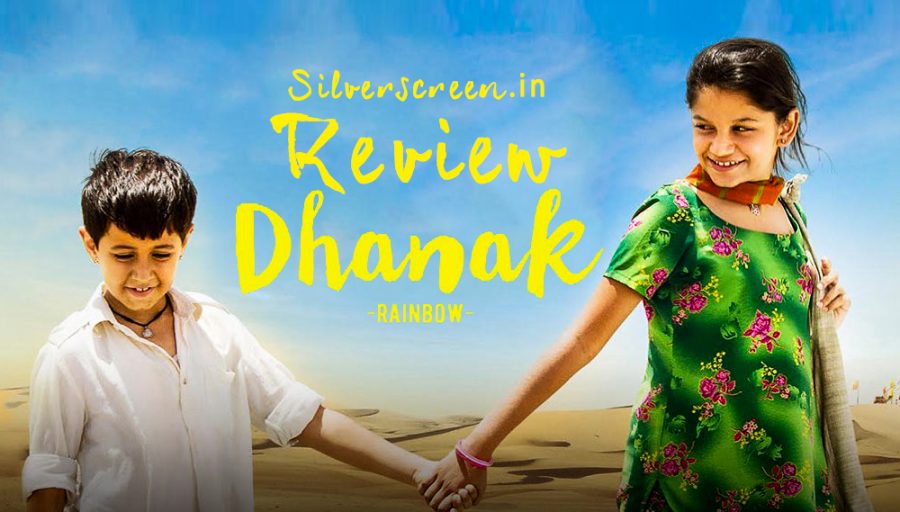In Nagesh Kokunoor’s Dhanak, two children journey across Rajasthan to meet their favourite movie idol. The road before them is rough, unfamiliar, and dangerous; but the sister and her blind younger brother are fearless. They cross the good, bad, and ugly; and in the end, find the Dhanak (rainbow) they yearned to see.
*****
Something about Rajasthan draws filmmakers, fuelling stories of fantasy and adventure set against its parched turf; films about travel, discovering the possibilities of life, and finding goodness. In Dev Benegal’s Road, Abhay Deol drives an old truck across the region’s vast desert, meeting and befriending mysterious strangers, and eventually, finding his life’s true calling. In Shah Rukh Khan’s Paheli, a spirit falls for a newly-wed woman.
Nagesh Kukunoor’s film has all this: journey, adventure, a little magic, and a lot of goodness. Kukunoor doesn’t try to rework any clichés. Mud houses, colourful wardrobes, white hitchhikers, folk singers; Dhanak has everything you’d expect from a Rajasthan tourism department’s promotional video. Yet, Dhanak is fresh and charming, thanks to its lead child actors who put up an incredible performance as two siblings.
*****
Pari (aged 10) and Chhottu (aged 8), live with an uncle and aunt in a hamlet in Rajasthan. The uncle is affectionate, but submissive before his wife, who is both stern and resentful of the children. Due to a malnourished diet, Chhottu lost his eyesight at the age of four. Pari is convinced that surgery will help his sight return. But the grownups have no plans to foot the medical expenses. A determined Pari, however, has promised Chottu that she will find the money for the operation before he turns nine. When she sees a poster of her idol, Shah Rukh Khan, at a local film theatre, she decides to seek his help; because she knows, her hero is rich and kind.
*****
Having made the critically-acclaimed Dor, Kokunoor is familiar with the landscape and culture of Rajasthan. In fact, there is even a gentle nod to Dor in one scene. The Rajasthan of the film is in stark contrast to the Rajasthan in Michael Winterbottom’s Trishna or Nawazuddin Siddiqui’s acclaimed short film, Highway. On the road, the children encounter strangers who are curious, but do not pose a threat. No sexual predators, thieves, or murderers here. The only menace they come across is a clumsy kidnapper. When Pari hesitates before accepting chocolates from a fellow traveller, Chottu slyly taunts her, “Learn to trust people!” Dhanak wants people to trust each other. Be honest with each other. Be kind to each other. In a nutshell, Dhanak is set in an utopia.
This utopic nature of the film makes the narrative predictable. The audience stops worrying about the children; we know nothing bad can happen to them.
*****
The more pressing emotion for the film is hope. Pari is convinced that they will meet Shah Rukh in Jaisalmer; the audience knows better. It becomes clear that Shah Rukh Khan is as inaccessible to Pari as he is to Kukunoor’s small indie movie. The movie, in this amused self-referential way, takes a dig at this inaccessibility, on both counts.
*****
Like Pari, Dhanak doesn’t treat Chottu or his disability with condescension, impatience, or pity. It focuses on his chirpiness, courage, and his brazen tongue. He is gutsy enough to say out loud that his aunt is evil. He is street smart, and doesn’t want sympathy from people.
It’s hard to believe that the two child actors, Krish Chhabria and Hetal Gada, aren’t siblings in real life. Their performance is natural, and their infectious, free-spirited energy is the most charming thing about the film.
*****
Recommended
Dhanak isn’t a typical road movie. Nor is it a coming-of-age film. There is no inward journey for its characters. The children do not lose their inherent innocence and grow into maturity. They remain the same. At most, they believe in magic a little more, and love each other a little more. Strangely enough, this lack of character transformation doesn’t make the movie any less engrossing.
Dhanak cannot match the impact of Iqbal or Dor. Nor does it have the fresh breeziness of Hyderabad Blues. But it does more than enough to reinforce Kokunoor’s credentials as the poster boy of Indian independent cinema.
*****
The Dhanak review is a Silverscreen original article. It was not paid for or commissioned by anyone associated with the movie. Silverscreen.in and its writers do not have any commercial relationship with movies that are reviewed on the site.



